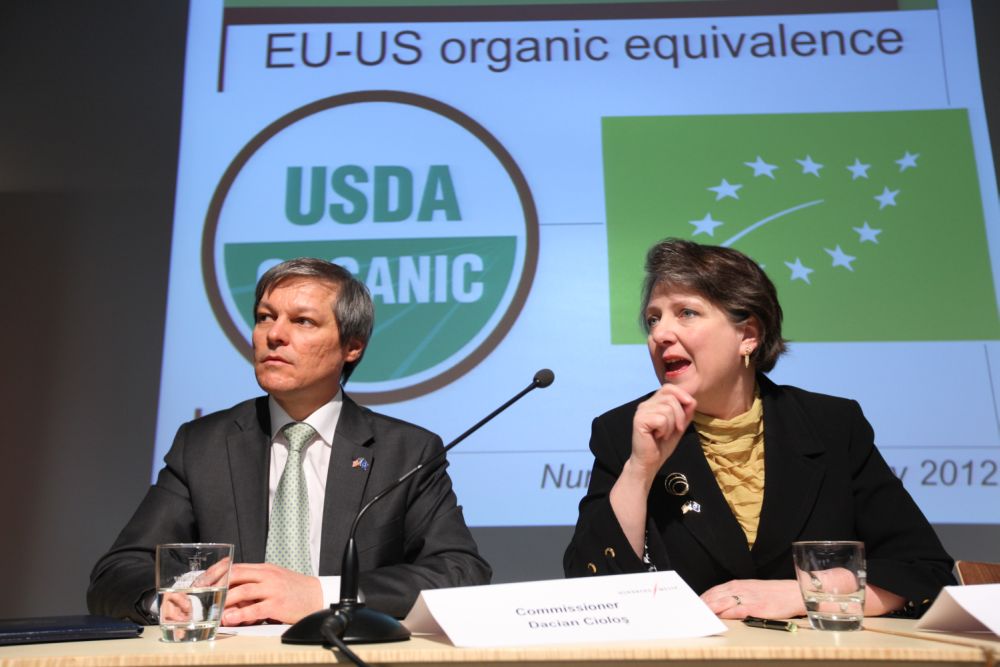EU and US inch toward talks on free trade area

Reuters | Thu Jun 21, 2012
EU and US inch toward talks on free trade area
By Sebastian Moffett and Doug Palmer
The United States and the European Union on Wednesday inched closer to starting negotiations on a long-desired free trade deal, with the release of a report calling for wide-ranging market opening and mutual acceptance of product standards.
U.S. President Barack Obama, whose administration is already pursuing a free trade agreement between the United States and 10 countries in the Asia Pacific region, referred to the US-EU initiative at a closing press conference on Tuesday at the Group of 20 leading economies summit in Las Cabos, Mexico.
"Today, the United States and the European Union agreed to take the next step in our work towards the possible launching of negotiations on an agreement to strengthen our already very deep trade and investment partnership," Obama said.
Obama and EU leaders urged the working group to "complete its work as quickly as possible" so a formal decision on whether to launch negotiations could be made later this year.
"A strong outcome can enhance not only transatlantic economic ties, but also address shared market access challenges in third countries and encourage a forward-looking multilateral trade liberalization agenda," said Obama, European Commission President Jose Manuel Barroso and EU Council President Herman Van Rompuy in a joint statement.
"Particularly at this time, a bold initiative to expand trade and investment could make a significant contribution to our strategy to strengthen growth and create jobs," they said.
The United States and the EU already have one of the largest trade and investment relationships in the world.
However, business groups on both sides have long pushed for a free trade agreement to eliminate remaining tariffs and to tackle regulatory barriers that impede trade in areas ranging from financial services to chemicals.
Businesses would like an agreement in which a car tested for safety in the United States would not have to be tested again in Europe, or a drug deemed safe by Brussels would not have to be approved by U.S. government experts.
EU Ambassador to the United States Joao Vale de Almeida called the joint report and the leader’s instructions to work toward launching talks on an ambitious agreement covering agriculture, services, manufactured goods and other sectors "very good news for both economies."
"I think the potential for gains in regulatory areas is maybe the most important one if you consider our tariffs are already at a very low level," Vale de Almeida said.
The EU-U.S. working group said in its report that a comprehensive free trade deal could eliminate tariffs and other barriers to trade in goods, services and investment, and enhance the compatibility of regulations and standards.
It could also lower "non-tariff" barriers such as some health and safety regulations, which hinder foreign businesses without formally penalising them.
"Based on our work thus far, the co-chairs of the High Level Working Group believe that a comprehensive transatlantic trade and investment agreement, if achievable, is the option that has the greatest potential for supporting jobs and promoting growth and competitiveness across the Atlantic," the report said.
The two sides should also seek to create "a more integrated transatlantic marketplace" by addressing issues arising from things like technical regulations and conformity assessment procedures, and by early consultation on regulations.
The report called on officials and businesses in both blocs to present concrete proposals by the end of the year to ease the regulatory differences that impede change.
"We are now entering the last leg of mapping out how we should tackle any eventual negotiation to boost growth and jobs through our trade partnership," EU Trade Commissioner Karel De Gucht said in a statement.
A trade-driven boost to economic growth and confidence would help both Obama, campaigning to be re-elected in November, and EU leaders, who are struggling with a financial crisis and near-zero growth.
Still, U.S. and EU officials worry about launching negotiations that could drag on for years without success, such as the Doha round of world trade talks, which started in 2001 and never reached an agreement.
Peter Rashish, vice president for Europe and Eurasia at the U.S. Chamber of Commerce, said he was encouraged by the report even though the two sides noted some worked remained on difficult issues before negotiations can be launched.
"My best guess is they are talking about some agriculture and regulatory issues. We’ve always thought those could be the most challenging, but I think the tone of the whole report is that these can be done. So I think we’re on the right path," Rashish said. (Reporting By Sebastian Moffett in Brussels and Doug Palmer in Washington; Editing by Roger Atwood)





